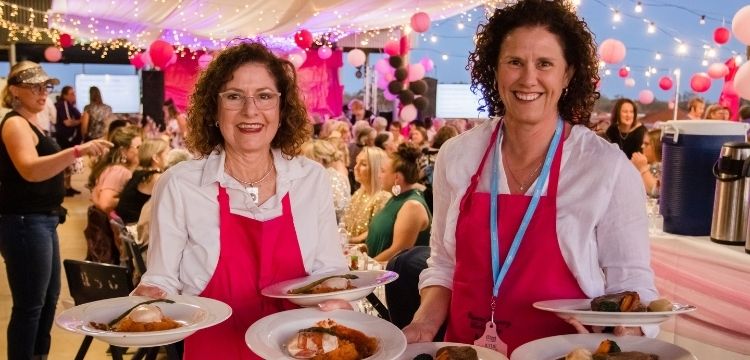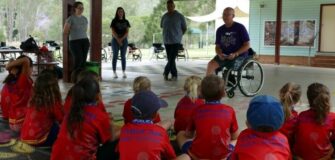Volunteers are proof of communities being ‘Better Together’
Share

FRRR is privileged to work with remote, rural and regional community organisations to help fund them to solve local problems, so they can build capacity and sustainability. These community organisations are groups of local people who share a vision for their community. They donate their time and service because they believe in their community and they want to make a difference. They belong to Australia’s volunteer army that is valued at an estimated $30 billion per year. They epitomise this year’s theme of ‘Better Together’.Volunteers are often the glue that hold small communities together. But they have been under incredible pressure over the past few years as one disaster after another kept coming their way. This was clearly confirmed in FRRR’s Heartbeat of Rural Australia report[1], and we continue to see it manifest, day to day.
The bottom line is that communities are in danger of missing out on essential services because such services are often delivered by volunteers that run community organisations.
Our research clearly showed that the desire to help each other is still strong within communities and people want to return to volunteering. People moving into new communities in particular want to join in, as a way to meet people.
So why am I so concerned about supporting volunteers and succession planning? Until recently, Australia had nearly six million people volunteers. This community service was valued at an estimated $30 billion, or a total of 596.2 million hours each year[2]. However, with the bushfires, floods and COVID pandemic over the past couple of years, we now have a third fewer volunteers. This meant that during the height of COVID, Australian communities missed out on around 293 million volunteer hours, or an estimated $13.5 billion in help and support.[3] This is a huge number!
Our Heartbeat of Rural Australia report found that volunteers have been fatigued and exhausted for years, but they have always remained optimistic. However, with floods, fires and a pandemic in the recent years, about one third of community organisations had to reduce volunteer hours or have lost volunteers altogether due to illness, isolation, relocation, or caring responsibilities. In many instances, our volunteers have been victims of these disasters in need volunteer services themselves.
Other key Heartbeat findings highlighting the crucial role of volunteers included:
- For people living in rural Australia, the access to health care services and wellbeing support is much more limited and, in some places, almost non-existent. For this reason, community organisations provide that bridge in connecting people with services. Without the volunteers that run these organisations, service delivery is put at risk – as is the wellbeing of communities.
- Global issues such as a pandemic, floods, fire, climate change, economic disruption, and wage disparity tend to be even more intense in regional communities. While our survey respondents were dealing with the pandemic, in the last two years, more than 50% were also dealing with drought; 37% faced bushfires; 26% floods; and nearly 20% dealt with the mouse plague. On the global stage, these issues can feel insurmountable, but small communities tend to roll up their sleeves and take up the challenges. This can be attributed to local community organisations – mostly led by volunteers – having a vision, tenacity, patience and an unwavering commitment to finding solutions.
- The compounding impact of cumulative disasters meant that many younger people were too busy managing their families’ needs to volunteer, and others found it hard to navigate the lockdown rules, resulting in fewer volunteers. This in turn put more pressure on the few “stalwarts” remaining to meet their communities’ needs.
So, it’s timely to keep talking about volunteering and succession planning. I feel optimistic that there is a real shift in policy and funding on the horizon that acknowledges the interconnectedness of rural communities, economies, and environments, appreciation of the value of investing in resilience of people and systems, infrastructure and digital connectivity. We just need to make sure those policies and approaches extend to supporting the volunteers that are the lifeblood of those communities.
Their economic, environmental and social impact is invaluable. It’s time that we look at how we can work ‘Better Together’ to keep communities connected. At FRRR, we know that we are better together, because every day we bring together philanthropy, government, businesses and individuals who share our belief in the important role of community-led groups. We provide grants and capacity building support to help make their ideas and vision reality. But we can only do so much.
Australia’s volunteer army are our unsung heroes. They generously donate their time and service to rebuilding communities and making them stronger, so in 2022, let’s come together as a country to find solutions and transform volunteering, so that no community ever misses out on essential services. This will be the blueprint for us to protect and care for the incredible volunteers who deliver services and care for remote, rural and regional communities. They are the multi-billion-dollar industry that we really can’t live without.
Natalie Egleton is the Chief Executive Officer of the Foundation for Rural & Regional Renewal (FRRR). With a 25-year career in the non-profit and philanthropic sector in consulting, fundraising and partnerships, and organisation development roles, she is passionate about facilitating effective and enduring responses to issues facing rural communities.
Since becoming CEO of FRRR in 2015 she has led the organisation through a period of significant growth and impact, facilitating over $80m in funding to remote, rural, and regional communities through hundreds of partnerships and collaborations.
Before joining FRRR, Natalie consulted with Matrix on Board, working with numerous not-for-profit organisations in program evaluation, undertaking research analysis and developing business plans. She also worked with clients to develop financial policies and procedures, strategic plans, organisation reviews, service mapping, feasibility studies and governance models.
Natalie has also held in-house roles at Evolve (Typo Station) and at ANZ Banking Group, implementing projects that made a tangible difference to the lives of people living in rural, regional and remote Australia. She has also held voluntary roles on Boards and Committees of a rural RTO and her local Pre-school.
Natalie holds a B. Social Science (Public Policy/Research/Public Relations), Grad Dip Applied Science (Organisation Dynamics), and is a Graduate of the Institute of Company Directors.
She lives in the small rural town of Maldon in central Victoria.

























